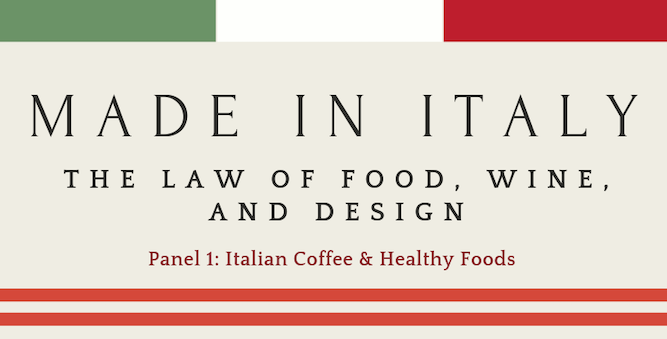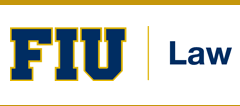
Event Title
Panel 1: Italian Coffee & Healthy Foods
Location
Large Courtroom, FIU College of Law
Start Date
21-2-2020 9:15 AM
End Date
21-2-2020 10:30 AM
Description
Contract Law in the Agri-Food Chain
Bianca Gardella Tedeschi, Università degli Studi del Piemonte Orientale “A. Avogadro”
Contract Law in the Agrifood chain in Italy is regulated by law 27/2012 art. 62. The law regulates B2B contracts with the specific aim of protecting producers. The law introduces a sort of “commercial ethic” into the agrifood chain, as it defines unfair business practices in this specific field. In 2019, the UE approved directive UE 2019/633 that prohibits in every Member State unfair business practices that are harmful for producers. The paper will assess how the law and the directive have been implemented and how effective they can be for producers.
The Legal Architecture of Coffee
Helena Alviar García, Universidad de Los Andes, Colombia & Sciences Po Law School, Paris
Coffee is essential to Italian culinary experience and lifestyle. In an article published by the Eataly online magazine, Italian coffee culture is described in the following way: “The day is defined by coffee rituals: a cappuccino with breakfast, a caffè macchiato–or two–as an afternoon pick-me-up, and espresso after dinner. And like any culture, that of Italian coffee comes with seemingly mysterious laws. Order a latte, and you’ll receive a glass of milk (which is exactly what you ordered). Ask for a to-go cup or order a cappuccino after 11 a.m., and risk an instant tourist label.”
Despite its relevance, coffee is not produced in Italy. This essay will be dedicated to Colombian coffee, one of the many countries that export this product to Italy. Although described as the result of privileged geographical and weather conditions and the care of coffee growers, Colombian coffee is the product of a set of laws, regulatory privileges, institutional arrangements and public resources. As a consequence, the text will explore the legal architecture that makes Café de Colombia what it is.
Tradition, Authenticity and Provenance in European Food Governance and Beyond
Lorenzo Bairati, Universita di Scienze Gastronomiche di Pollenzo
In the communication of foodstuffs there is an overuse of the notion of quality. Consumers are highly attracted to this concept even if its features and boundaries remain absolutely vague. Quality encompasses such terms as authenticity, tradition, diversity, territory, craftsmanship and naturalness, but these factors are, in turn, ambiguous in and of themselves, and often contradicted by the latest evolution of food production and distribution.
This essay analyzes the relevance of these features in Europe from a legal perspective, as opposed to the homologation of tastes and cultures produced by the globalization of food systems. The reference to them in marketing and their reconstruction through PDOs and PGIs, as regulated by EU Regulation 1151/2011, is addressed in order to reflect the ongoing debate on food quality and its international protection.
Consumer expectations will be considered as a seminal parameter in assessing the European state of the art in food quality preservation, especially from the Italian perspective. Concluding remarks will analyze the international debate on the “Italian Sounding” phenomenon, stress the conflicting positions (mainly expressed by the EU and the US), and propose insights to consider this controversy from a new perspective.
Panel 1: Italian Coffee & Healthy Foods
Large Courtroom, FIU College of Law
Contract Law in the Agri-Food Chain
Bianca Gardella Tedeschi, Università degli Studi del Piemonte Orientale “A. Avogadro”
Contract Law in the Agrifood chain in Italy is regulated by law 27/2012 art. 62. The law regulates B2B contracts with the specific aim of protecting producers. The law introduces a sort of “commercial ethic” into the agrifood chain, as it defines unfair business practices in this specific field. In 2019, the UE approved directive UE 2019/633 that prohibits in every Member State unfair business practices that are harmful for producers. The paper will assess how the law and the directive have been implemented and how effective they can be for producers.
The Legal Architecture of Coffee
Helena Alviar García, Universidad de Los Andes, Colombia & Sciences Po Law School, Paris
Coffee is essential to Italian culinary experience and lifestyle. In an article published by the Eataly online magazine, Italian coffee culture is described in the following way: “The day is defined by coffee rituals: a cappuccino with breakfast, a caffè macchiato–or two–as an afternoon pick-me-up, and espresso after dinner. And like any culture, that of Italian coffee comes with seemingly mysterious laws. Order a latte, and you’ll receive a glass of milk (which is exactly what you ordered). Ask for a to-go cup or order a cappuccino after 11 a.m., and risk an instant tourist label.”
Despite its relevance, coffee is not produced in Italy. This essay will be dedicated to Colombian coffee, one of the many countries that export this product to Italy. Although described as the result of privileged geographical and weather conditions and the care of coffee growers, Colombian coffee is the product of a set of laws, regulatory privileges, institutional arrangements and public resources. As a consequence, the text will explore the legal architecture that makes Café de Colombia what it is.
Tradition, Authenticity and Provenance in European Food Governance and Beyond
Lorenzo Bairati, Universita di Scienze Gastronomiche di Pollenzo
In the communication of foodstuffs there is an overuse of the notion of quality. Consumers are highly attracted to this concept even if its features and boundaries remain absolutely vague. Quality encompasses such terms as authenticity, tradition, diversity, territory, craftsmanship and naturalness, but these factors are, in turn, ambiguous in and of themselves, and often contradicted by the latest evolution of food production and distribution.
This essay analyzes the relevance of these features in Europe from a legal perspective, as opposed to the homologation of tastes and cultures produced by the globalization of food systems. The reference to them in marketing and their reconstruction through PDOs and PGIs, as regulated by EU Regulation 1151/2011, is addressed in order to reflect the ongoing debate on food quality and its international protection.
Consumer expectations will be considered as a seminal parameter in assessing the European state of the art in food quality preservation, especially from the Italian perspective. Concluding remarks will analyze the international debate on the “Italian Sounding” phenomenon, stress the conflicting positions (mainly expressed by the EU and the US), and propose insights to consider this controversy from a new perspective.

